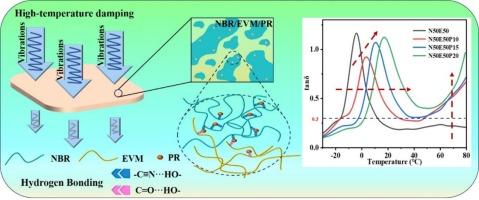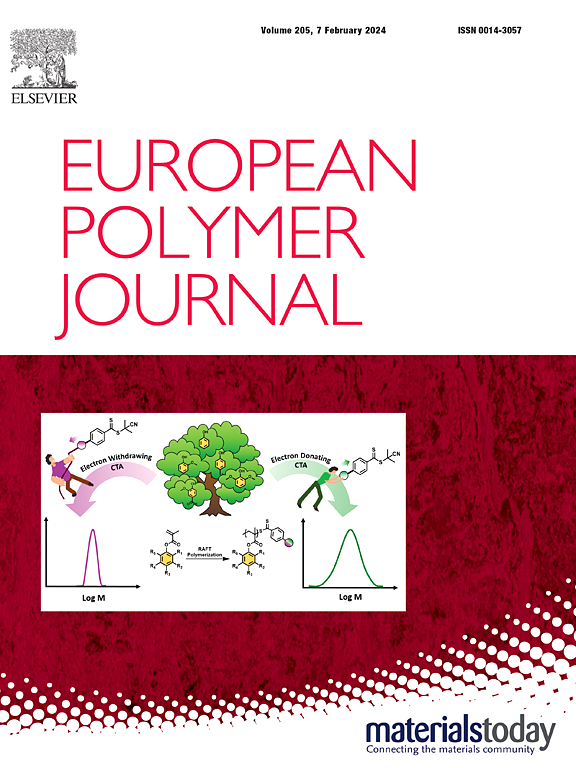通过酚醛树脂诱导相分离大幅提高丁腈橡胶/乙烯-醋酸乙烯共混物的阻尼性能
IF 6.3
2区 化学
Q1 POLYMER SCIENCE
引用次数: 0
摘要
普通硫化橡胶的玻璃化转变温度(Tg)较低,有效阻尼温度范围(EDTR)较窄,阻尼性能大打折扣,极大地限制了其在高温环境条件下的应用。本研究通过熔融共混工艺将酚醛树脂(PR)加入丁腈橡胶/乙烯-醋酸乙烯(NBR/EVM)共混物中,比较研究了 PR 诱导的微观结构和阻尼性能变化。结果表明,PR 诱导了共混物的相分离,大部分 PR 颗粒选择性地位于丁腈橡胶组分中。分子动力学模拟证实,三元共混物中形成的氢键更多,自由体积分数也有所降低。三元共混物显示出良好的高温阻尼性能,并明显提高了 Tg(高达 17.7 °C)和 EDTR(82.6 °C,从 -2.6 到 80 °C)。此外,三元共混物还表现出良好的机械性能,包括更高的延展性和更大的断裂能,以及更好的能量耗散能力。这项工作为提高普通硫化橡胶在高温下的阻尼性能提供了另一种解决方案。本文章由计算机程序翻译,如有差异,请以英文原文为准。

Largely enhanced damping performance of nitrile rubber/ethylene–vinyl acetate blends via phenolic resin-induced phase separation
The low glass transition temperature () and narrow effective damping temperature range (EDTR) greatly restrict the application of common vulcanized rubbers in fields relating to high temperature environmental condition due to the greatly reduced damping performances. In this work, phenolic resin (PR) was incorporated into nitrile rubber/ethylene–vinyl acetate (NBR/EVM) blends through melt-compounding processing, and the microstructure and damping performance changes induced by PR were comparatively investigated. The results show that PR induces the phase separation of the blends and most of PR particles selectively locate in the NBR component. Molecular dynamics simulation confirms that more hydrogen bonds form in the ternary blends, and reduced free volume fraction is also achieved. The ternary blends show good high-temperature damping performances, and apparently enhanced (up to 17.7 °C) and EDTR (82.6 °C, from −2.6 to 80 °C) are also achieved. Additionally, the ternary blends exhibit good mechanical properties, including higher ductility and larger fracture energy, and better energy dissipation ability. This work provides an alternative resolution way to enhance the damping performances of the common vulcanized rubbers at high temperatures.
求助全文
通过发布文献求助,成功后即可免费获取论文全文。
去求助
来源期刊

European Polymer Journal
化学-高分子科学
CiteScore
9.90
自引率
10.00%
发文量
691
审稿时长
23 days
期刊介绍:
European Polymer Journal is dedicated to publishing work on fundamental and applied polymer chemistry and macromolecular materials. The journal covers all aspects of polymer synthesis, including polymerization mechanisms and chemical functional transformations, with a focus on novel polymers and the relationships between molecular structure and polymer properties. In addition, we welcome submissions on bio-based or renewable polymers, stimuli-responsive systems and polymer bio-hybrids. European Polymer Journal also publishes research on the biomedical application of polymers, including drug delivery and regenerative medicine. The main scope is covered but not limited to the following core research areas:
Polymer synthesis and functionalization
• Novel synthetic routes for polymerization, functional modification, controlled/living polymerization and precision polymers.
Stimuli-responsive polymers
• Including shape memory and self-healing polymers.
Supramolecular polymers and self-assembly
• Molecular recognition and higher order polymer structures.
Renewable and sustainable polymers
• Bio-based, biodegradable and anti-microbial polymers and polymeric bio-nanocomposites.
Polymers at interfaces and surfaces
• Chemistry and engineering of surfaces with biological relevance, including patterning, antifouling polymers and polymers for membrane applications.
Biomedical applications and nanomedicine
• Polymers for regenerative medicine, drug delivery molecular release and gene therapy
The scope of European Polymer Journal no longer includes Polymer Physics.
 求助内容:
求助内容: 应助结果提醒方式:
应助结果提醒方式:


